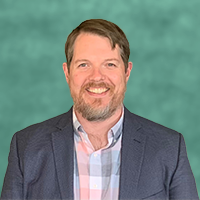Andrew Roberts, Ph.D.
Chief Executive Officer
A personal take from Andrew Roberts on his work with AFSI, what inspires him, and the challenges in the sector.

What inspires you? What drives your work?
AFSI is a public service organization, and the short answer is that I want to make the world a better place. This doesn’t necessarily mean “change the world” in big and revolutionary ways. I firmly believe that in the fractious, polarized conversations that dominate public discourse a lot of “win-win” opportunities are being lost or drowned out by distracting and pointless disagreement. Creating an environment for productive dialogue and allowing people to truly understand and frame the questions that will help them make decisions about agriculture and food will improve people’s lives — from subsistence farmers in poor rural economies to urban consumers in wealthy economies we are all impacted by agriculture and food systems.
“Watching the “aha!” moments of sudden understanding around intractable issues that take place whenever we bring people together for our events is what keeps me interested in my work.”
What do you hope to accomplish with your work?
We will not be able to improve people’s lives until or unless we are able to better understand how to efficiently evaluate technologies for environmental risk and food safety and then allow those safe technologies to reach the hands of agricultural producers and consumers.
How are you using your expertise to advance AFSI’s mission?
Science is at the heart of AFSI’s mission, but the medium we use to accomplish it is communication. All of the science in the world will not be useful to address our shared problems if the people who need to make decisions can’t understand it — or even understand why it is relevant to their decision. My background as a researcher, and with a regulatory agency, has helped me understand and recognize this need, and my time at AFSI has been spent studying this challenge and developing tools and methods to apply them.
I have a natural inclination and an interest in helping people understand complex issues. Being able to talk to researchers, as well as regulators and policymakers, listen to them in order to appreciate their viewpoint and understand their needs then help them better understand each other is probably the largest contribution I make at AFSI. A technical background in science and molecular biology is required to do this, but it’s not sufficient.
What impact will that have on people's lives?
We have both direct and indirect impacts on people’s lives. For our stakeholders, the scientists we work with directly, we are hoping to help them achieve their goals. Whether this is the successful completion of research into new technologies that will benefit society, bringing to market safe and beneficial agricultural products, or developing sound, science-based agricultural policies and regulations that advance public policy objectives.
But we help people be the best they can at helping others. Our primary stakeholders make contributions to agriculture and food systems that have lasting impacts on the lives of farmers, and consumers. Whether that’s improving the health and safety of subsistence farmers by allowing the introduction of new crop varieties that reduce the use of potentially toxic pesticide sprays, improve weed management options and raise farm income, or improving consumer choice through the introduction of nutritionally enhanced foods, agriculture and food systems touch every individual and every stratum of society all around the world.
What's the best part about working at AFSI?
AFSI is a small organization, and it is a pleasure to work with such a dedicated team of motivated experts. When I start my day, I know that I will be interacting with a team of smart, capable, and well-intentioned people who are pursuing a common goal of making the world a better place.
What are you most proud of?
When I joined what is now AFSI, it was for the purpose of helping build a program that would provide scientific support for accomplishing risk assessment for biotechnology. That program has grown and thrived for more than a decade, producing publications, trainings, and organizing scientific seminars and symposia that have had a demonstrable impact on the conversations taking place around biotechnology, environmental risk assessment, and food safety assessment.
It is a challenging environment to obtain funding and to accomplish our public service mission when discussions around biotechnology in the public space are often fractious and disjointed, with a disconnect between science, social values, and policy goals. But when we work with our stakeholders, they recognize that AFSI is working for their benefit – not advancing an agenda or pursuing our own interests. And for this reason, they come back time and again to ask us to continue or expand our work.
When people approach me and recognize the quality and value of the work that AFSI produces, and also the trust that we have built among the community of scientists and regulators in the biotechnology space, that is what I am most proud of.
